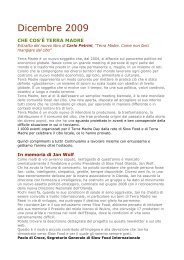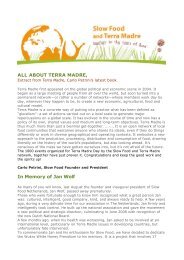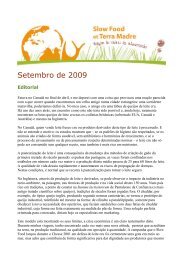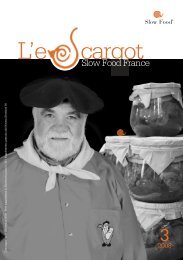all the food that's fit to print The Education Issue - Slow Food
all the food that's fit to print The Education Issue - Slow Food
all the food that's fit to print The Education Issue - Slow Food
Create successful ePaper yourself
Turn your PDF publications into a flip-book with our unique Google optimized e-Paper software.
ut young farmers, chefs, and o<strong>the</strong>r players in <strong>food</strong> communities worldwide.<br />
Obviously, <strong>the</strong> concept of global awareness and engagement is nothing<br />
new <strong>to</strong> <strong>Slow</strong> <strong>Food</strong>. However, what makes youth so essential <strong>to</strong> advancing this<br />
global community is our incentive <strong>to</strong> push beyond ideology. We have little <strong>to</strong><br />
lose in confronting <strong>the</strong> forces that oppose us and in experimenting with new<br />
projects. We are extremely creative in working with limited resources and are<br />
determined <strong>to</strong> make “real <strong>food</strong>” more accessible <strong>to</strong> a wider population. We<br />
trust and value <strong>the</strong> wisdom of those more experienced than us, and we take<br />
<strong>the</strong>ir guidance and examples in<strong>to</strong> account as we undertake immediate, wellplanned<br />
action. We are at <strong>the</strong> same time idealistic and realistic, acknowledging<br />
that <strong>the</strong>re are better ways of producing <strong>food</strong>, but that modern lifestyles and<br />
ingrained ways of thinking must be considered.<br />
Worldviews are, of course, one of <strong>the</strong> most difficult barriers <strong>to</strong> face in<br />
bringing about <strong>the</strong>se kinds of changes. Even among <strong>the</strong> brightest and most<br />
forward-thinking young minds, <strong>the</strong>re is much resistance <strong>to</strong> change for a<br />
number of reasons. It takes courage <strong>to</strong> accept <strong>the</strong> realities of our <strong>food</strong> systems,<br />
and it’s easy <strong>to</strong> ignore <strong>the</strong> current and potential ramifications of <strong>the</strong> way we<br />
Continued on page 21<br />
Greener Pastures<br />
Organic dairy does a student body good<br />
— By Noelle Ferdon<br />
<strong>The</strong> consumer demand for organic and rBGH-free<br />
milk has risen <strong>to</strong> <strong>all</strong> time highs in <strong>the</strong> United States.<br />
Fortunately, <strong>the</strong> interest in producing milk <strong>to</strong> meet this<br />
higher quality standard has risen <strong>to</strong>o. At <strong>the</strong> same time,<br />
<strong>the</strong>re is a new generation of milk producers learning<br />
hands-on organic techniques, thanks <strong>to</strong> a new organic<br />
dairy at California State University, Chico (CSUC).<br />
In spring 2007 CSUC opened <strong>the</strong> campus-based Center<br />
for Organic Dairy Production, only <strong>the</strong> second of its kind<br />
in <strong>the</strong> country. After meeting Tony Azevedo, an organic<br />
dairyman in <strong>the</strong> San Joaquin v<strong>all</strong>ey, and hearing his<br />
s<strong>to</strong>ry about going organic, Dr. Cindy Daley, direc<strong>to</strong>r of<br />
<strong>the</strong> Center, was convinced that going organic was a wise<br />
decision for <strong>the</strong> future success of <strong>the</strong> program. Dr. Daley<br />
has worked <strong>to</strong> convert 85 acres of land at <strong>the</strong> Chico State<br />
Farm, as it is known loc<strong>all</strong>y, <strong>to</strong> certified organic pasture,<br />
where students can graze a sm<strong>all</strong> herd. With <strong>the</strong> campuswide<br />
commitment <strong>to</strong> sustainability, <strong>the</strong> timing was<br />
perfect for <strong>the</strong> dairy program <strong>to</strong> go organic.<br />
However, it takes more than just teaching students<br />
organic methods <strong>to</strong> make organic a long-term and viable<br />
option for <strong>the</strong> dairy: <strong>the</strong> milk has <strong>to</strong> go somewhere!<br />
Fortunately, <strong>the</strong> dairy program was able <strong>to</strong> forge a<br />
partnership with Organic V<strong>all</strong>ey, a nationwide cooperative<br />
of organic milk producers. Organic V<strong>all</strong>ey began in 1988<br />
as a farmer-owned cooperative that serves sm<strong>all</strong> farmers<br />
by providing a cooperative approach <strong>to</strong> purchasing and<br />
marketing. <strong>The</strong> CSUC dairy pools its milk with o<strong>the</strong>r<br />
organic producers in <strong>the</strong> western region, which is <strong>the</strong>n<br />
sold under <strong>the</strong> Organic V<strong>all</strong>ey label or used <strong>to</strong> make valueadded<br />
products like cheese or butter. This partnership<br />
is a win-win situation for <strong>the</strong> new generation of organic<br />
sm<strong>all</strong>-scale farmers as well as conscientious consumers.<br />
<strong>The</strong> local convivium in Chico, <strong>Slow</strong> <strong>Food</strong> Shasta<br />
Cascade (SFSC), was also thrilled about <strong>the</strong> new organic<br />
dairy. When <strong>the</strong> Eat Well Guided Tour of America, hosted<br />
by Sustainable Table and <strong>Food</strong> & Water Watch, came<br />
through Chico in July 2007, SFSC immediately planned a<br />
s<strong>to</strong>p <strong>the</strong>re. On a sunny summer morning, SFSC leaders<br />
and members got on <strong>the</strong> bus and headed out <strong>to</strong> <strong>the</strong> Chico<br />
State Farm. It was just what one would expect from a<br />
visit <strong>to</strong> an organic dairy—happy, healthy cows munching<br />
on green pasture. <strong>The</strong> community is proud <strong>to</strong> see our<br />
state university contribute <strong>to</strong> a regional, sustainable <strong>food</strong><br />
system that is good, clean, and fair, while also educating a<br />
new generation of leaders in organic <strong>food</strong> production.<br />
Noelle Ferdon is a founding member and co-leader of <strong>Slow</strong> <strong>Food</strong> Shasta<br />
Cascade, <strong>the</strong> nor<strong>the</strong>rnmost convivium in California. Noelle is a Senior<br />
Organizer of <strong>Food</strong> Campaigns in California for <strong>Food</strong> & Water Watch. For<br />
more information, contact Noelle Ferdon at nferdon@fwwatch.org<br />
<strong>The</strong> snail | spring 2008<br />
7







